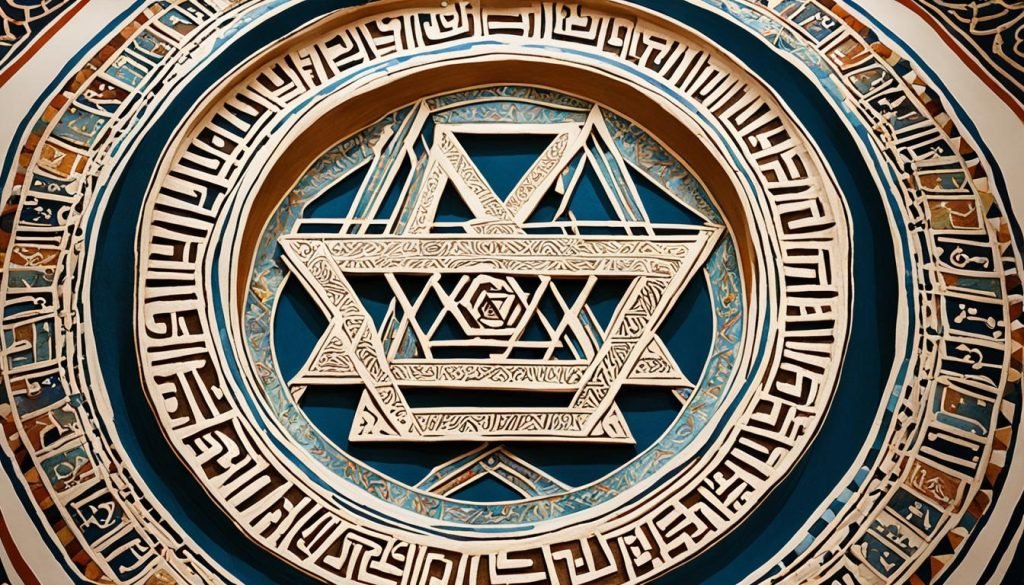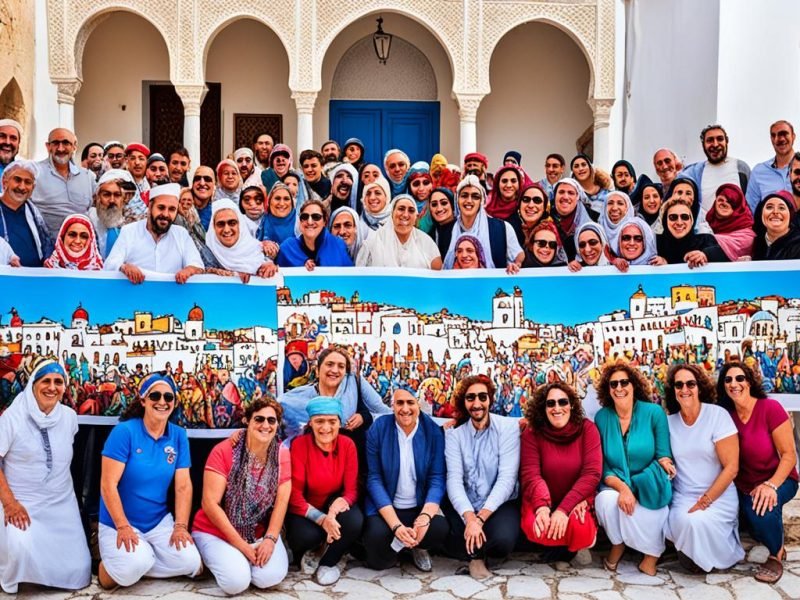Did you know that the Tunisian Jewish community has a rich history spanning centuries, yet its population has significantly decreased in recent years? Despite the challenges faced by this community, there are ongoing efforts by the Tunisian government to protect and preserve their heritage. In this article, we will explore the safety of Jews in Tunisia, the historical context of their presence, the challenges they encounter, and the initiatives taken to preserve their cultural identity.
Key Takeaways:
- The Tunisian Jewish community has a long history, dating back to the second century during Roman rule.
- Instances of anti-Semitic incidents and a politically uncomfortable climate raise concerns about the safety of Tunisian Jews.
- The Tunisian government provides security for synagogues and subsidizes the restoration and maintenance of Jewish heritage sites.
- The Jewish population in Tunisia has significantly decreased, with around 1,000 Jews currently residing in the country.
- Despite the challenges, Jewish organizations and institutions continue to contribute to the cultural life of Tunisia.
History of Jews in Tunisia
The history of Jews in Tunisia dates back to the second century during the Roman rule. The Jewish community had a significant presence in the country, contributing to its cultural and economic development. However, they also faced discrimination and persecution under various rulers throughout history.
During the Byzantine period, the Jewish community in Tunisia experienced widespread discrimination. They were subjected to oppressive laws and restrictions, limiting their religious practices and social mobility. Despite these challenges, Jews managed to maintain their identity and cultural traditions during this period.
The arrival of the Ottoman Empire in the 16th century brought some improvement in the conditions for the Jewish community. The Ottomans granted them certain rights and religious freedom, allowing the Jewish community to flourish and thrive. Synagogues were built, and Jewish scholars played a vital role in the intellectual and economic life of Tunisia.
However, the 20th century saw a significant shift in the treatment of Jews in Tunisia. During the Vichy rule in World War II, anti-Semitic laws were enforced, leading to the persecution and marginalization of the Jewish community. Many Jews were stripped of their rights and properties, and some were even imprisoned or deported.
This period marked a turning point for the Jewish population in Tunisia, leading to increased emigration to other countries. Tunisian Jews sought refuge in Israel and various European countries, seeking safety and better opportunities for themselves and their families.
“The discrimination faced by the Jewish community throughout history has had a profound impact on their lives and culture. Despite these challenges, they have managed to preserve their rich heritage and traditions.”
Jewish Presence under Roman Rule
During the height of the Roman Empire, Jews settled in various parts of North Africa, including Tunisia. They played a significant role in trade, agriculture, and cultural exchange, contributing to the prosperity of the region.
Ottoman Empire and Improved Conditions
The arrival of the Ottoman Empire brought relative stability and improved conditions for the Jewish community in Tunisia. The Ottomans recognized the importance of the Jewish population and their contributions to society, granting them certain rights and protections.
Discrimination during Byzantine Period
The Byzantine period was marked by discrimination and oppression against the Jewish community in Tunisia. Jews faced restrictions on their religious practices and were treated as second-class citizens. Despite these challenges, they managed to preserve their cultural identity and passed down their traditions to future generations.
Anti-Semitic Laws during Vichy Rule
The Vichy rule in Tunisia during World War II brought about the enforcement of anti-Semitic laws. Jews were subjected to persecution, confiscation of property, and imprisonment. These laws marked a dark period in the history of Jews in Tunisia, leading to increased emigration.
Emigration of Tunisian Jews
As a result of the discriminatory policies and hostile environment, many Tunisian Jews chose to emigrate to other countries. The establishment of the State of Israel provided a safe haven for Jewish communities around the world, including those from Tunisia.
| Key Events | Year |
|---|---|
| Jewish settlement under Roman rule | 2nd century |
| Discrimination during Byzantine period | 6th-7th century |
| Ottoman Empire and improved conditions | 16th century |
| Anti-Semitic laws during Vichy rule | 1942-1943 |
| Emigration of Tunisian Jews | 20th century |
Despite the hardships faced by the Jewish community in Tunisia throughout history, their resilience and determination have allowed them to preserve their heritage and play an important role in the country’s cultural landscape.
Challenges and Security Concerns
Tunisian Jews have faced a multitude of challenges and security concerns in recent years. The presence of anti-Semitic incidents has heightened anxieties within the community and raised questions about their safety. Perhaps the most distressing incidents include the desecration of Jewish graves and the alarming attack on the historic Ghriba synagogue.
These hateful acts of vandalism not only strike at the heart of the Jewish community but also shake the very foundations of religious freedom and tolerance in Tunisia. The desecration of Jewish graves serves as a painful reminder of the persistent presence of anti-Semitism and the challenges faced by Tunisian Jews.
The attack on the Ghriba synagogue further underscores the uncomfortable political climate surrounding Jewish communities in Tunisia. The assault on this sacred place of worship not only caused physical damage but also instilled fear and unease within the Jewish population.
“We must stand united against all forms of hate and intolerance. The attack on the Ghriba synagogue is an attack on our shared values of peace, coexistence, and respect for all faiths.” – Government official
In addition to specific incidents, the political climate in Tunisia has created an uncomfortable environment for Jews. Anti-Israel sentiments can often spill over into anti-Semitic attitudes, making it challenging for Tunisian Jews to openly express their religious and cultural identity.
Despite these challenges, there is hope that Tunisia can actively address and confront these issues, fostering an atmosphere of inclusivity, respect, and mutual understanding.
Preservation of Jewish Heritage
Despite the challenges faced by the Jewish community in Tunisia, there are numerous efforts to preserve their rich cultural heritage. The Tunisian government plays a vital role in protecting and safeguarding synagogues, ensuring their security and well-being. These measures not only serve to protect the physical structures but also demonstrate the government’s commitment to the preservation of Jewish heritage.
In addition to government protection, there are subsidized restoration programs for synagogues, which aid in maintaining and revitalizing these historical sites. The financial support provided by the government helps preserve the architectural and cultural significance of the synagogues, enabling future generations to appreciate and learn from them.
Furthermore, multifaith initiatives have been instrumental in fostering tolerance and religious diversity in Tunisia. These initiatives aim to promote peaceful coexistence and encourage dialogue among different religious communities, including Jews. By engaging in interfaith dialogue and collaboration, Tunisians work together to create an inclusive society that values and respects diverse cultural practices.
Another essential aspect of preserving Jewish heritage in Tunisia is the celebration of Jewish rituals and traditions. Tunisian Jews partake in unique rituals and celebrations that have been passed down through generations. One noteworthy event is the annual pilgrimage to the Ghriba synagogue, located on the island of Djerba. This pilgrimage not only serves as a religious observance but also represents a cultural gathering where Tunisian Jews come together to honor their faith and heritage.
Moreover, Tunisian Jews have established Jewish schools and yeshivot, which play a crucial role in teaching and passing down Jewish customs, traditions, and knowledge to younger generations. These educational institutions contribute to the preservation and continuation of Jewish culture in Tunisia.
Preservation of Jewish Heritage – Government Protection of Synagogues
| Efforts | Description |
|---|---|
| Government Security Measures | The Tunisian government provides security for synagogues, ensuring the physical safety of these places of worship. |
| Subsidized Restoration Programs | The government offers subsidies to assist in the restoration and maintenance of synagogues, preserving their historical and cultural significance. |
| Multifaith Initiatives | Collaborative efforts among different religious communities promote tolerance, peaceful coexistence, and respect for religious diversity. |
| Jewish Rituals and Celebrations | Tunisian Jews partake in unique rituals and celebrations, such as the annual pilgrimage to the Ghriba synagogue, upholding their cultural heritage. |
| Jewish Schools and Yeshivot | Established educational institutions ensure the transmission of Jewish customs, traditions, and knowledge to future generations. |

By actively preserving Jewish heritage, Tunisia strives to create an inclusive society that values cultural diversity, religious freedom, and mutual respect. The efforts of the government, along with the participation of various religious communities, contribute to the ongoing protection and celebration of the vibrant Jewish culture in Tunisia.
Jewish Population and Cultural Life
The Tunisian Jewish population has seen a significant decline over the years, with approximately 1,000 Jews currently residing in the country. The majority of the community is concentrated in the capital city of Tunis, as well as the island of Djerba and the town of Zarzis.
Despite the challenges faced by the Jewish community, there are still active Jewish organizations, institutions, and synagogues that contribute to the cultural life of Tunisia. These organizations play a vital role in preserving Jewish traditions, fostering a sense of community, and providing support for the thriving Jewish presence in Tunisian society.
The observance of Jewish traditions remains an important aspect of Tunisian Jewish life. Many Jews in Tunisia continue to uphold the laws of kashrut, ensuring that their food is prepared in accordance with Jewish dietary guidelines. Synagogues serve as spiritual and communal centers, hosting religious services, ceremonies, and celebrations.
Table: Jewish Organizations and Institutions in Tunisia
| Organization | Description |
|---|---|
| Central Jewish Council of Tunisia | An umbrella organization representing the Tunisian Jewish community and advocating for their rights and interests. |
| Ghriba Synagogue | Located on the island of Djerba, it is one of the oldest synagogues in the world and a site of pilgrimage for Jews. |
| Association of Jewish Scouts of Tunisia | An organization promoting Jewish values and traditions through scouting activities for young people. |
| Tunis Jewish Community Center | A community center offering cultural, educational, and social programs for the Tunisian Jewish community. |
These organizations and institutions play a crucial role in preserving the Tunisian Jewish heritage, fostering interfaith dialogue, and promoting understanding and tolerance within Tunisian society.
Conclusion
In conclusion, the safety of Jews in Tunisia is a complex issue that requires ongoing attention and vigilance. The Tunisian Jewish community has faced historical challenges, including instances of violence, discrimination, and anti-Semitic sentiment. However, there have been efforts by the Tunisian government to protect and preserve the heritage of the Jewish community.
Despite these efforts, concerns remain regarding the security situation and the political climate in Tunisia. Anti-Semitic incidents, such as the desecration of Jewish graves and the attack on the Ghriba synagogue, highlight the need for continued vigilance and awareness.
To ensure the safety and well-being of Tunisian Jews, it is crucial for both the government and society as a whole to remain committed to fostering an environment of tolerance, respect, and religious freedom. Ongoing efforts for preservation, including the protection of synagogues and the promotion of multifaith initiatives, are essential to maintaining the Tunisian Jewish community’s unique heritage and cultural identity.
In order to create a secure and inclusive society, it is important for Tunisians to stand against any form of anti-Semitism and work towards creating an environment where all individuals, regardless of their religion or ethnic background, can live without fear. Only through collective efforts can the safety and well-being of Jews in Tunisia be ensured.







